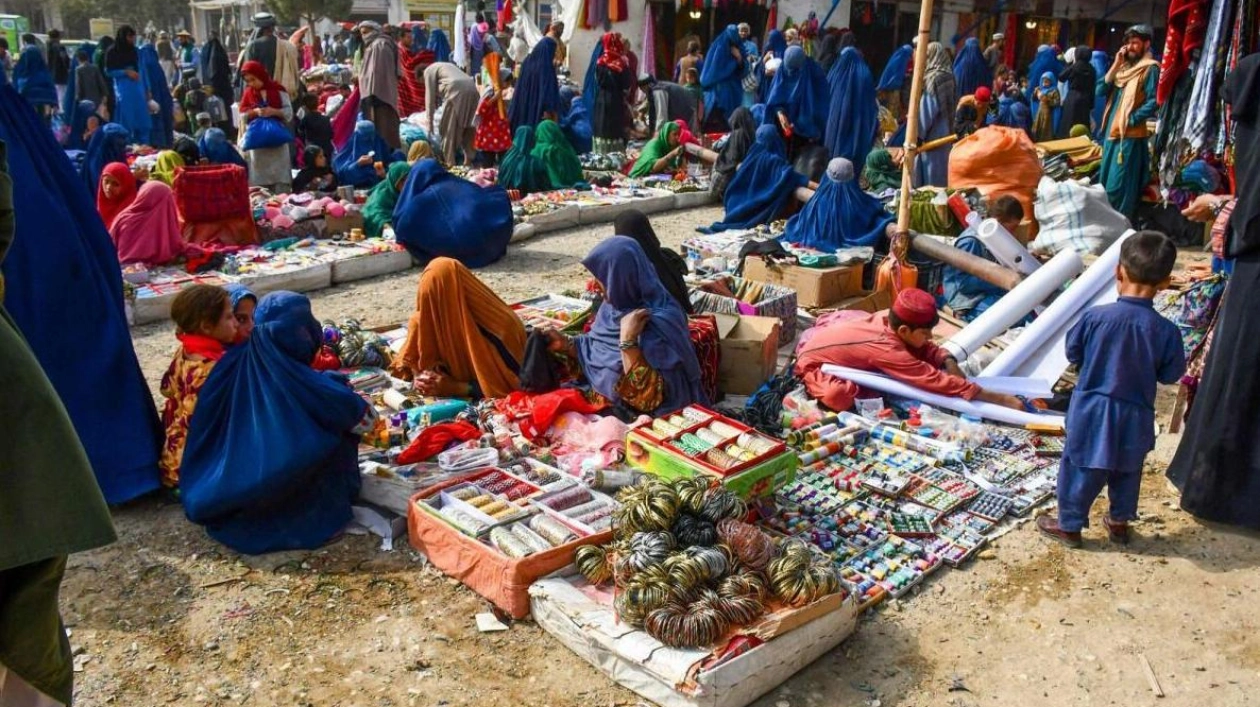On October 22, 2024, women dressed in burqas were seen selling accessories at a market in Chahar Bolak district, Balkh province, Afghanistan. This scene was captured by AFP.
Afghanistan's Ministry for the Propagation of Virtue and the Prevention of Vice (PVPV) is progressively enforcing a ban on media images of living beings. Several provinces have already implemented restrictions, and some Taliban officials are declining to be photographed or filmed, according to journalists nationwide. Since mid-October, the PVPV has been holding meetings with journalists across various provinces, informing them about the gradual implementation of a ban on capturing and publishing images of living beings, as per a recent 'vice and virtue' law.
During the Taliban's previous rule from 1996 to 2001, television was completely banned, but a similar decree has not been issued since they overthrew the Western-backed government three years ago. The enforcement of many articles in the 'vice and virtue' law, which outlines the Taliban government's strict interpretation of Islamic law and includes comprehensive behavioral codes, has been inconsistent. However, journalists are worried about the potential for a full crackdown, which would make Afghanistan the only Muslim-majority country to impose such bans.
A journalist from central Daikundi province expressed deep concern, stating, 'Taking photos and images is an integral part of journalism.' Following a recent PVPV announcement, media in Daikundi have only been permitted to record audio at events. The journalist also noted that the full implementation of this rule could lead to many media professionals losing their jobs.
Although a full ban has not yet been imposed, many ministries and government officials in Kabul continue to post pictures of people. Celia Mercier, head of the South Asia Desk for Reporters Without Borders (RSF), commented that it seems the supreme leader, Hibatullah Akhundzada, and his allies in Kandahar want to reinstate the Taliban's '90s policy, where images of living beings were forbidden. However, she also mentioned that some Taliban officials do not necessarily agree with these new restrictions and that imposing more restrictions could lead to discontent among the population, already affected by the ban on school for young girls, women's rights, and other measures.
PVPV has been leading a campaign to enforce the law. On October 14, the ministry's spokesman, Saiful Islam Khyber, stated that the ban on images of living beings 'applies to all Afghanistan...and it will be implemented gradually'. Since then, multiple events announced by Taliban officials, primarily from PVPV but also from other ministries and governor offices, as well as some private events, have explicitly prohibited photography and filming.
In Kabul, the PVPV ministry invited media to a meeting with community leaders, similar to those held in five other provinces, where only audio recording was allowed, and journalists were instructed to put their phones away. An organizer of a gathering in northern Badakhshan to honor the recently killed Palestinian Hamas chief told AFP that the event was canceled partly because PVPV officials objected to Yahya Sinwar's image on a poster. In neighboring Takhar province, at least two provincial TV channels stopped broadcasting living beings in mid-October, opting instead to show logos and landscapes with audio.
The information ministry has not responded to requests for comment. Three years since the Taliban's takeover, Afghanistan has dropped 56 places to 178th out of 180 countries in RSF's global ranking for press freedom. Officials in the Taliban heartland of southern Kandahar have long been barred from taking photos and videos at events. More recently, in August, the Kandahar branch of state-run news program RTA stopped broadcasting provincial news after the new law was announced, according to an RSF report published on Thursday. Major Afghan broadcaster Tolo News continues to show people and animals, as does the national broadcast of RTA.
Mercier warned that there is 'a real fear there will one day be a total ban in the country', noting that times have changed since the Taliban's first rule, with smartphones and TVs now ubiquitous. 'What is quite paradoxical is that we see the Taliban leaders using audiovisual media to communicate and promote themselves,' she said. However, some others appear to be adhering—the spokesman for the higher education ministry has posted only pictures of buildings and landscapes since October 3.
Source link: https://www.khaleejtimes.com






